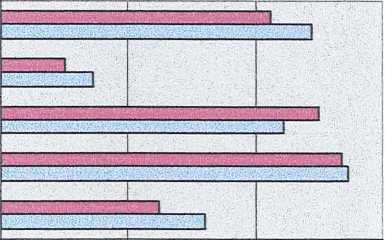234
ethos varies from one classroom to another. In addition, pupils within the same
classroom may have different perceptions of classroom ethos. Overall, 5th graders were
significantly more likely to perceive satisfaction, friction, and competitiveness in
mathematics classes than 8th graders. 8th graders were more likely to perceive difficulties
in mathematics classes than 5th graders. There was no significant difference in their
perceptions of cohesiveness (see Figure 7.3.1 and Table 7.3.1).
Figure 7.3.1: Mean scores of pupils’ perceptions of classroom ethos in mathematics
classes
5
4
3
2
1

□ 8th graders
□ 5th graders
0 12 3
I=Satisfaction, 2=Cohesiveness, 3=Difficulty, 4=Friction, S=Competitiveness
Table 7.3.1: Mean scores and standard deviation of pupils’ perceptions of classroom
ethos in mathematics classes
|
5tt1 graders |
8th graders | |||||
|
N |
M__ |
SD |
N___ |
M___ |
SD | |
|
Satisfaction t=7.211, df=2868.588, p<.01 |
1384 |
1.60 |
1.45 |
1981 |
1.24 |
1.37 |
|
Cohesiveness t=. 784, df=3336, p>.05 |
1377 |
2.73 |
1.70 |
1961 |
2.68 |
1.67 |
|
Difficulty t= 6.324, df=3140.930, p<.01 |
1396 |
2.22 |
1.24 |
1983 |
2.50 |
1.34 |
|
Friction t=6.629, df=2938.360, p<.01____________ |
1391 |
.72 |
.96 |
1985 |
.50 |
.93 |
|
Competitiveness t=5.984, df=2919.841, p<.01 |
1389 |
2.44 |
1.56 |
1978 |
2.12 |
1.51 |
Correlations were undertaken between the sub-scales for students of both age groups. A
significant positive correlation existed between satisfaction and cohesiveness, among
the responses of pupils of both age groups, although the correlations were relatively
weak. There was also a weak but significant correlation between friction and
competitiveness among the responses of 5th graders (Table 7.3.2).
234
More intriguing information
1. The name is absent2. GENE EXPRESSION AND ITS DISCONTENTS Developmental disorders as dysfunctions of epigenetic cognition
3. The Role of Trait Emotional Intelligence (El) in the Workplace.
4. Washington Irving and the Knickerbocker Group
5. Can we design a market for competitive health insurance? CHERE Discussion Paper No 53
6. Monetary Discretion, Pricing Complementarity and Dynamic Multiple Equilibria
7. On the Existence of the Moments of the Asymptotic Trace Statistic
8. Passing the burden: corporate tax incidence in open economies
9. The Importance of Global Shocks for National Policymakers: Rising Challenges for Central Banks
10. Notes on an Endogenous Growth Model with two Capital Stocks II: The Stochastic Case